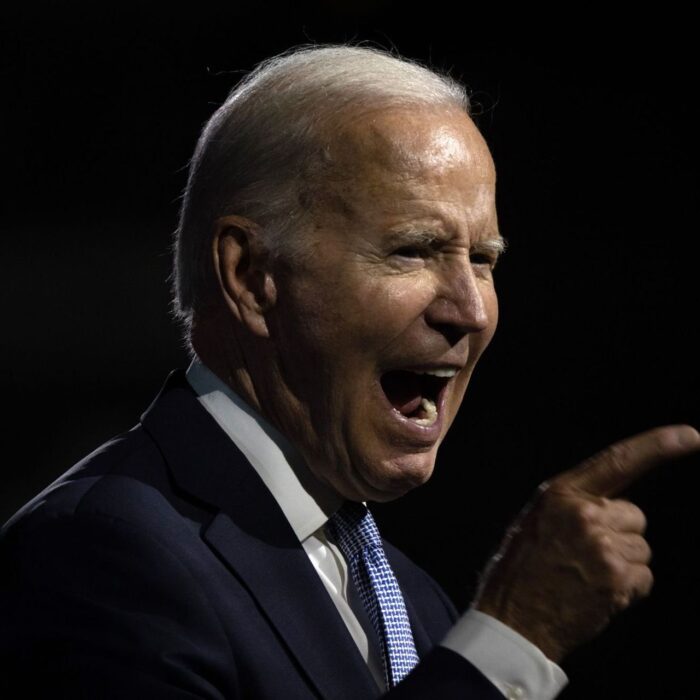White House To Meet With Community Leaders In Michigan
High-ranking White House officials are planning to visit Michigan next week in an effort to reach out to Muslim and Arab leaders amid growing tensions over President Joe Biden’s handling of the ongoing conflict between Israel and Palestine.
The planned meetings come as Biden faces tough poll numbers, particularly in swing states, with many Muslim Americans expressing their disappointment and anger over his pro-Israel stance. The president’s re-election campaign manager, Julie Chavez Rodriguez, was previously set to meet with local elected officials and community leaders in Dearborn, Michigan, but those plans were canceled due to backlash from the Muslim community.
According to four sources familiar with the plans, Tom Perez, director of the White House Office of Intergovernmental Affairs, Deputy National Security Adviser Jon Finer, and White House liaison to American Muslim Communities Mazen Basrawi will all be in attendance at the planned meetings. The topics of discussion are expected to revolve around current policies related to the Israel-Hamas war, which has been ongoing since October 7th, when Hamas launched a terrorist attack on Israel.
The decision to cancel Friday’s group meeting between the Biden campaign manager and Arab and Muslim leaders came after several Arab American political leaders from Metro Detroit, who are Democrats, refused to attend. They cited the ongoing violence in Gaza, where more than 26,000 people have been killed and an additional 65,000 have been wounded since October. Many in the community believe that Biden’s continued support for Israel’s military actions in Gaza has led to the deaths of innocent Palestinians.
President Biden’s national campaign manager was sent to Michigan to meet with a group of Arab and Muslim American leaders on Friday. I was invited to attend.
— Abdullah H. Hammoud (@AHammoudMI) January 26, 2024
The cancelation of the group meeting highlights the growing frustration and anger within the Arab and Muslim communities towards Biden’s stance on the Israel-Hamas war. With Michigan being home to one of the largest Arab American populations in the country, the Biden campaign is deeply concerned about losing their support, especially since he won the state by a narrow margin in the 2020 election. Recent polls have shown that two-thirds of Michigan’s Muslim and Arab Americans are now no longer willing to support Biden in the upcoming 2024 election.
Many in the Muslim and Arab communities feel that Biden’s handling of the Israel-Hamas conflict has not been strong enough and that he has not done enough to call for a ceasefire. Several State Department staffers have also accused the president of “spreading misinformation” about the war. As a result, there has been a collective effort within the community to hold the Biden campaign accountable for their actions, which is a major reason why the group meeting was canceled, according to one of the organizers, Sarhad Turfe.
In addition to the group meeting, the Biden campaign had also planned to meet with Muslim leaders individually, but those meetings have also faced backlash. Dearborn Mayor Abdullah Hammoud, Wayne County Commissioner Sam Beydoun, and Democratic state Representatives Alabas Farhat and Abraham Aiyash were among those invited, but all have declined to attend. Aiyash, who serves as Michigan’s House majority floor leader, stated that he will “not allow our communities to be utilized for political expediency” and that there needs to be a ceasefire before any discussions can take place.
The fact that many Muslim and Arab American leaders have refused to meet with the Biden campaign despite their efforts, such as sending Julie Chavez Rodriguez, highlights the severity of the situation. Leaders in the community feel that sending a campaign official instead of a White House representative is “tone-deaf” and shows a lack of understanding and empathy toward their concerns. Leaders also expressed their disappointment that the Biden campaign had not reached out to them earlier about the conflict and that there seems to be a lack of concern for the well-being of the Arab and Muslim communities in Michigan.
The cancelation of the group meeting and the backlash from Muslim and Arab leaders in Michigan serves as a warning sign for Biden and his reelection campaign. With less than four years until the next election, the president needs to address the concerns and disappointment of the Muslim and Arab communities in order to secure their vote. As the conflict in Gaza continues to escalate, many in the community feel that Biden’s lack of action is causing irreparable harm and they are no longer willing to support him. It remains to be seen how the Biden administration will respond to this backlash and if they will take any measures to repair the relationship with Michigan’s Muslim and Arab Americans.

